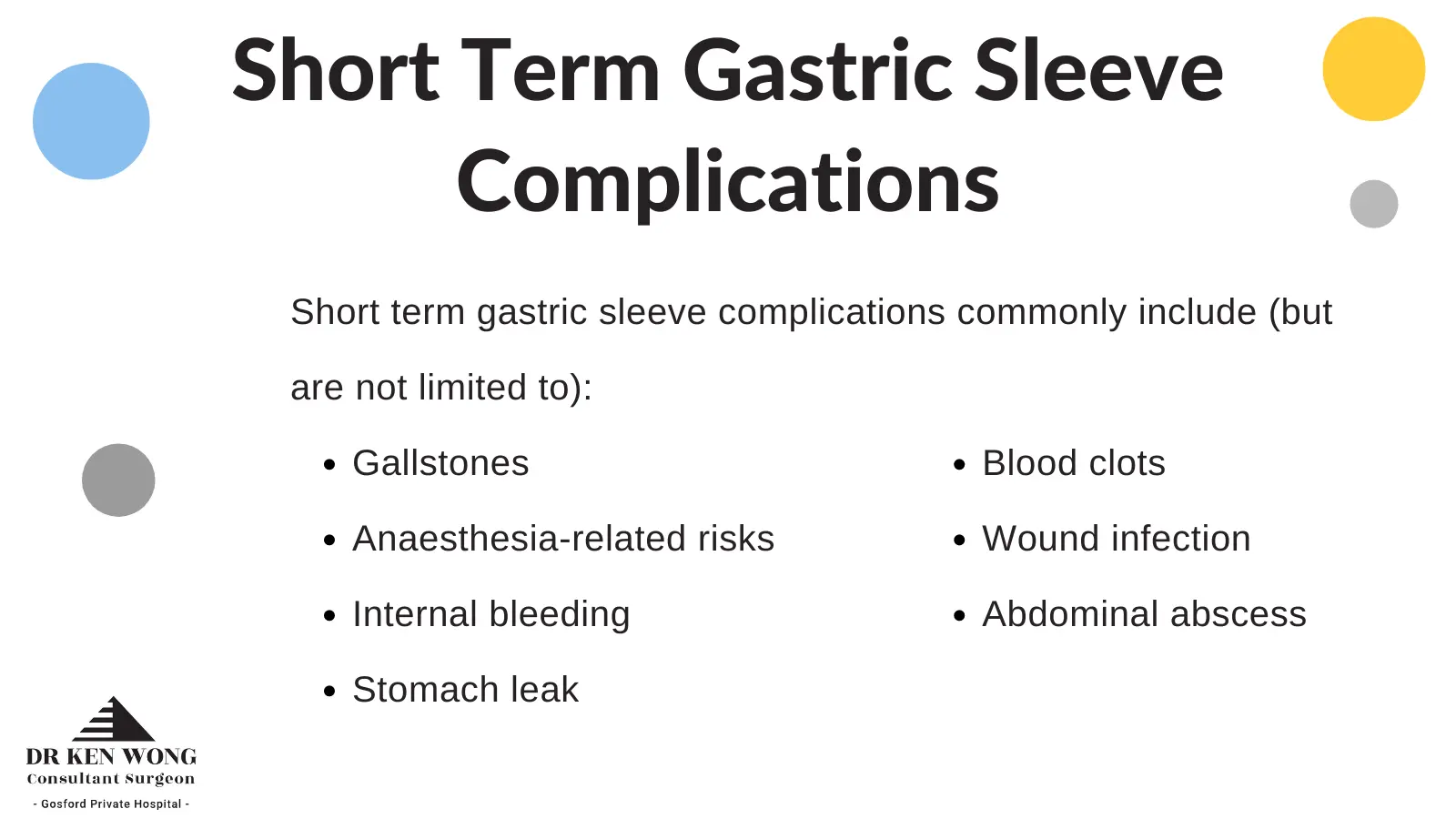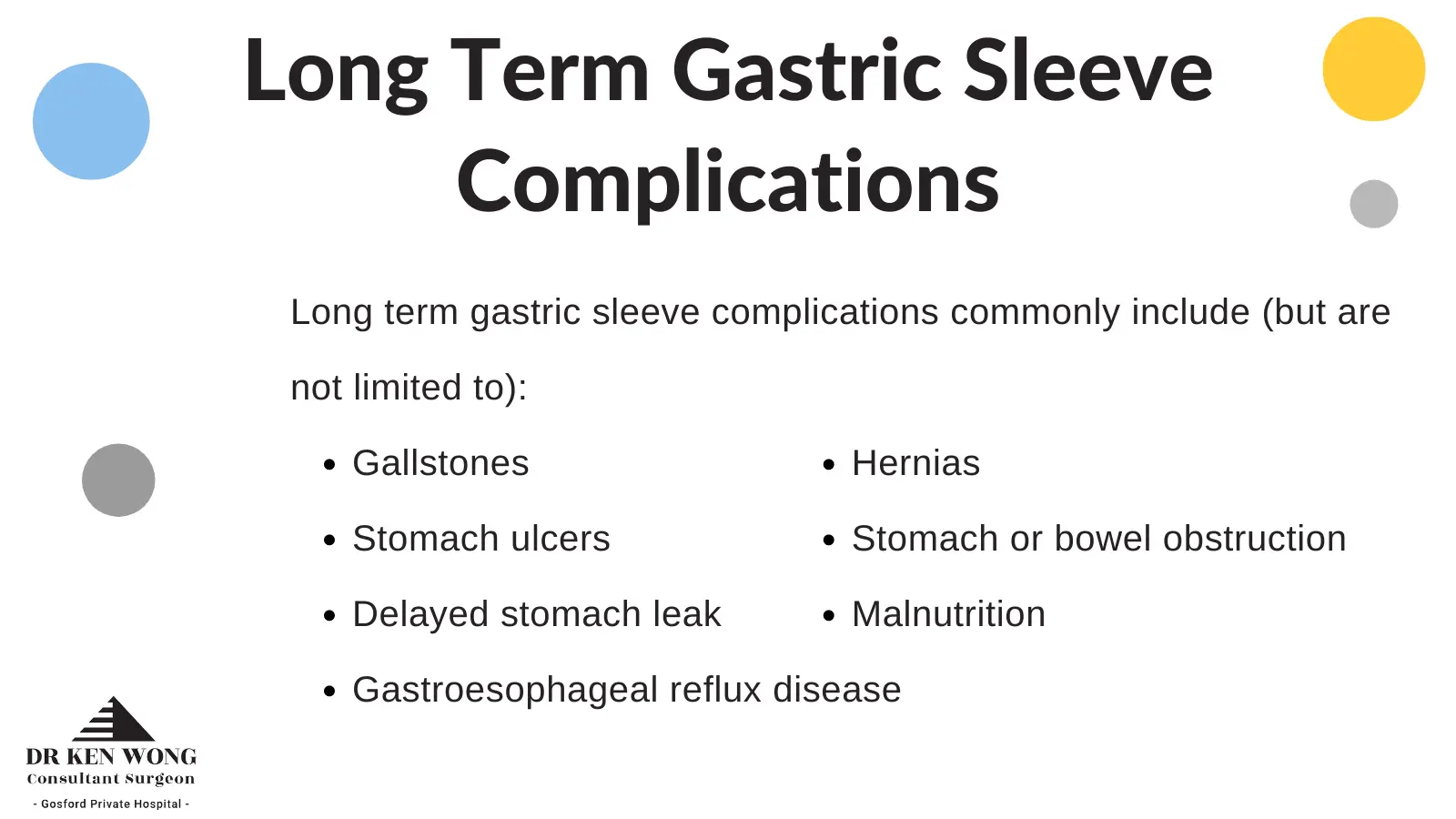Gastric sleeve surgery is a fantastic option for overweight or obese people to achieve significant weight loss and prevent obesity-related illnesses and mortality. However, as is the way with any surgical procedure, gastric sleeve surgery complications can occur in patients.
Whilst gastric sleeve surgery is an excellent option for sustained weight loss, it doesn’t come without risk. All gastric sleeve surgeons are responsible for clearly outlining the potential complications of gastric sleeve surgery before patients decide to have surgery.
This article aims to provide patients considering gastric sleeve surgery a brief outline of short-term gastric sleeve complications, long term sleeve surgery complications, symptoms and signs of gastric sleeve complications, gastric sleeve complication rate and how to prevent gastric sleeve complications. Please note that this article outlines just a few of the potential complications of gastric sleeve surgery. All patients must consult a bariatric surgeon, like Central Coast Surgery, before deciding to have surgery.
It's worth noting here that gastric sleeve surgery is one of the most practised and safe bariatric surgeries performed in Australia. At Central Coast Surgery, our resident surgeon Dr Ken Wong prides himself on the clinic’s commitment to patient trust, comfortability and safety for all gastric sleeve Newcastle and Central Coast procedures. However, while gastric sleeve complications are rare, it’s our job as medical professionals to also make sure that our patients are well-educated.
Short Term Gastric Sleeve Complications
This section of the article will outline the short-term complications of gastric sleeve surgery. Short term gastric sleeve complications can include (but are not limited to):

- Gallstones
- Anaesthesia-related risks
- Internal bleeding or profuse bleeding of the surgical wound
- Stomach leak
- Blood clots
- Wound infection
- Abdominal abscess
Anaesthesia
Like any surgery, the anaesthetic can pose a risk in surgery. Anaesthetists must assess patients to identify risk factors before heading into surgery. It’s worth noting that anaesthetic procedures on overweight or obese patients carry more risk than patients with a healthy weight. One of the biggest concerns is associated with sleep apnoea, as anaesthesia causes patients to lose consciousness. We recommend consulting an anaesthetist directly to discuss potential complications of gastric sleeve surgery.
Bleeding
A significant consideration of gastric sleeve complications is internal bleeding or bleeding of the surgical wound. Bleeding will typically happen within 24 hours of surgery and occurs at the stomach’s staple line closure. The signs of gastric sleeve complications related to bleeding include:
- Rapid pulse
- Pale appearance
- Dizziness
- Shortness of breath
- Minimal urination
Gastric sleeve complications related to bleeding can be resolved through an extension of the hospital stay for monitoring. However, profuse bleeding may require a blood transfusion and further monitoring.
Stomach Leak
A gastric sleeve leak or stomach leak is a rare but severe factor to consider in sleeve surgery complications. A gastric sleeve leak occurs in around 1 out of 200 patients and involves a hole in the staple line closure, which causes stomach fluids to leak into the abdominal cavity.
If unattended, gastric sleeve leaks can develop an infection that leads to sepsis, a serious condition that leads to the malfunctioning of various organs. In the worst cases, sepsis can lead to death.
Signs of gastric sleeve complications related to a stomach leak include:
- Dizziness
- Rapid heart rate
- Worsening abdominal pain
- Left chest or shoulder pain
- Swelling of the abdomen
- Shortness of breath
- Fever
Gastric sleeve complications related to stomach leaks are serious issues and must be diagnosed and resolved through open surgery.
Blood Clots
Blood clots are another potential complication of gastric sleeve surgery. Blood clots are dangerous because they can separate from the site and travel to critical organs such as the heart, disrupting the blood flow.
Blood clots occur in less than 1% of patients and are more likely to occur in obese patients. Preventative measures reduce the risk of blood clots, including blood thinning tablets before surgery, and leg squeezing throughout the surgery. Getting patients walking within two hours of surgery is another critical preventative factor that we always implement.
Wound Infection
After surgery, the incision site may become infected within 7-10 days post-surgery. Symptoms of wound infection post gastric sleeve surgery include:
- Red and hot to touch at the infection site
- Inflamed or thickened skin
- Pus may discharge from the site of the wound
- Fever
Wound infections are relatively simple to treat, through draining the pus, gauzing the wound, and antibiotics.
Abdominal Abscess
Sleeve surgery complications such as an abdominal abscess are rare, occurring in every 1 out of 300-500 patients. An abdominal abscess is a collection of pus localised at the stomach, and they’re dangerous because when left untreated, they can cause inflammation and kill healthy tissue. Symptoms of an abdominal abscess include:
- Rapid heart rate
- Fever
- Abdominal distention with or without vomiting
Gastric sleeve complications related to an abdominal abscess can be identified with a CT scan and are treated through draining the cavity. Antibiotics will also help treat the infection once the pus is drained from the cavity, and the patient will likely have to stay in the hospital for monitoring until the abscess clears.
Long Term Gastric Sleeve Complications
Now that we have indicated short-term gastric sleeve complications, let’s look at longer-term potential gastric sleeve surgery complications. Some long-term gastric sleeve complications can include:

- Gallstones
- Gastroesophageal reflux disease
- Stomach ulcers
- Delayed stomach leak
- Hernias
- Stomach or bowel obstruction
- Malnutrition
Gallstones
Gallstones are a common form of gastric sleeve complications. According to Bariatric Innovations in Atlanta, the rate of developing gallstones after gastric sleeve is reportedly as high as 35%. The gallstones are a direct side effect of rapid weight loss. A six-month course of medication post-surgery can prevent the formation of gallstones.
The signs of gastric sleeve complications related to gallstones include:
- Acute pain in the upper abdomen
- Pain in the right shoulder
- Nausea and vomiting
A Laparoscopic Cholecystectomy surgical procedure is required to resolve gastric sleeve complications related to gallstones.
Gastroesophageal Reflux Disease
Gastroesophageal Reflux Disease, also commonly known as heartburn, is prevalent after surgery. However, the symptoms are not life-threatening. The most common symptoms include bloating and an upset stomach.
Stomach Ulcers
Stomach ulcers are more likely after gastric sleeve surgery and can cause internal bleeding. Common symptoms of contracting a stomach ulcer can include dark stool, pain in the stomach or blood in the vomit. An upper endoscopy is required to diagnose stomach ulcers. The treatment of ulcers consists of a round of antibiotics and acid-suppressing medications.
Delayed Stomach Leak
Stomach leaks generally occur within a week after surgery; however, there have been cases of the stomach area that is stapled leaking months after surgery. A delayed stomach leak can lead to infection and sepsis if unattended, so alike short-term leaks, they should be addressed immediately and professionally.
Hernias
A hernia can form at the location of the incision months or even years after surgery. Hernias are treated through surgical removal.
Stomach or Bowel Obstruction
A stomach or bowel obstruction after gastric sleeve surgery is very rare. It is caused by a kink or twist in the stomach tube, leading to moderate to severe abdominal pain or vomiting. Usually, a stomach or bowel obstruction can be treated unobtrusively. Otherwise, in rarer cases, an operation is required to untwist the stomach.
Malnutrition
Malnutrition is another gastric sleeve complication caused by prolonged periods of nausea and vomiting. Although nausea exists in as many as 70% of gastric sleeve patients, nausea should pass within 48 hours of the operation. Frequent vomiting can cause nutritional intake problems as patients may not be able to absorb enough nutrients post-surgery.
One way to combat malnutrition caused by nausea is to maintain hydration between meals and eat foods that are easy to absorb and digest instead of aggravating the stomach during digestion.
Gastric Sleeve Complication Rate
There’s no doubt about it – gastric sleeve surgery can significantly improve successful patients’ quality of life. But what exactly is the gastric sleeve complication rate?
The gastric sleeve complication rate does depend on the type of symptom a patient is experiencing. Some complications are common and can occur in up to a third of gastric sleeve patients. However, other symptoms, such as an abdominal abscess, are far less likely, occurring in only 1 out of every 300-500 patients. These complications can, however, become more likely due to the risks of weight loss surgery overseas. These complications can, however, become more likely due to the risks of weight loss surgery overseas.
Mortality rates of gastric sleeve surgery are extremely low. In 2010, a Stanford University Study indicated the average death rate related to gastric sleeve surgery is only 0.08% or less than one death per 1000 procedures.
Ready for a Gastric Sleeve Surgery Consultation?
Before deciding if gastric sleeve surgery is right for you, we highly recommend booking a consultation to speak to a professional about gastric sleeve complications. Dr Ken Wong of Central Coast Surgery is a highly experienced bariatric surgeon backed up by dieticians, psychologists and specialist obesity physicians. The team at Central Coast Surgery are committed to helping our clients maximise positive outcomes from gastric sleeve surgery.
If you’re thinking about undertaking gastric sleeve surgery and require further clarification on sleeve surgery complications, don’t hesitate to contact the Central Coast Surgery team to request a consultation.
